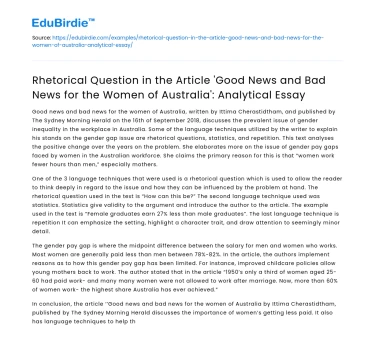Good news and bad news for the women of Australia, written by Ittima Cherastidtham, and published by The Sydney Morning Herald on the 16th of September 2018, discusses the prevalent issue of gender inequality in the workplace in Australia. Some of the language techniques utilized by the writer to explain his stands on the gender gap issue are rhetorical questions, statistics, and repetition. This text analyses the positive change over the years on the problem. She elaborates more on the issue of gender pay gaps faced by women in the Australian workforce. She claims the primary reason for this is that “women work fewer hours than men,” especially mothers.
One of the 3 language techniques that were used is a rhetorical question which is used to allow the reader to think deeply in regard to the issue and how they can be influenced by the problem at hand. The rhetorical question used in the text is “How can this be?” The second language technique used was statistics. Statistics give validity to the argument and introduce the author to the article. The example used in the text is “Female graduates earn 27% less than male graduates”. The last language technique is repetition It can emphasize the setting, highlight a character trait, and draw attention to seemingly minor detail.
The gender pay gap is where the midpoint difference between the salary for men and women who works. Most women are generally paid less than men between 78%-82%. In the article, the authors implement reasons as to how this gender pay gap has been limited. For instance, improved childcare policies allow young mothers back to work. The author stated that in the article “1950’s only a third of women aged 25-60 had paid work- and many many women were not allowed to work after marriage. Now, more than 60% of women work- the highest share Australia has ever achieved.”
In conclusion, the article ‘’Good news and bad news for the women of Australia by Ittima Cherastidtham, published by The Sydney Morning Herald discusses the importance of women’s getting less paid. It also has language techniques to help the reader get a better understanding of the text.






 Stuck on your essay?
Stuck on your essay?

